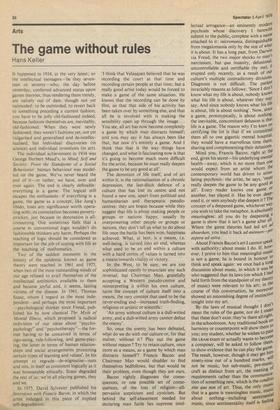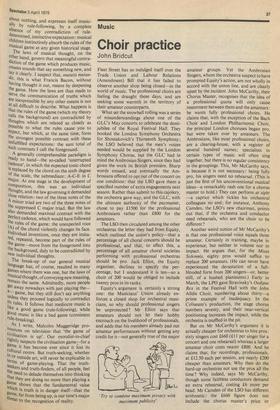Arts
The game without rules
Hans Keller
It happened in 1934, at the very latest; so the intellectual teenagers—be they seven- teen or seventy—who, the day before yesterday, conferred advanced status upon games theories, thus rendering them trendy, are naïvely out of date, though not yet outmoded: to be outmoded, to revert back to something preceding a current fashion, you have to be jolly old-fashioned indeed, because fashions themselves are, inevitably, old-fashioned. When they were newly fashioned, they weren't fashions yet, not yet vulgarised and generalised and de-intellec- tualised, but individual discoveries (in science) and individual inventions (in art).
The individual achievement in 1934 was George Herbert Mead's, in Mind, Self and Society: From the Standpoint of a Social Behaviorist: human behaviour was model- led on the game. We've never heard the end of it—or rather, we have, over and over again. The end is clearly definable: everything is a game. The logical still escapes the enthusiasts: if everything is a game, the game as a concept, like Jung's libido, loses any significance worth opera- ting with; its connotation becomes poverty- stricken, just because its denotation is all- consuming. One sometimes feels that a course in conventional logic wouldn't do fashionable thinkers any harm. Perhaps the teaching of logic should be considered as important for the job of coping with life as the teaching of mathematics.
Two of the saddest moments in the history of the epidemic known as game theory were reached in 1961 and 1975, when two of the most outstanding minds of our age refused to avail themselves of the intellectual antibiotics available to them and became joyful and, it seems, lasting victims of the disease. In 1961, Thomas Szasz, whom I regard as the most inde- pendent--and perhaps the most important —psychological thinker since Freud, pub- lished his by now classical The Myth of Mental Illness, which proposed 'a radical redivision of our ideas about "psycho- pathology" and "psychotherapy"—the for- mer having to be conceived in terms of sign-using, rule-following, and game-play- ing, the latter in terms of human relation- ships and social arrangements promoting certain types of learning and values'. In his attempt to regrade—de-stigmatise—nuts and nits, in itself as consistent logically as it was honourable ethically, Szasz degraded the rest of us: we're all playing games, they and we.
In 1975, David Sylvester published his Interviews with Francis Bacon, in which the artist indulged in this piece of implied self-degradation : 'I think that Velasquez believed that he was recording the court at that time and recording certain people at that time; but a really good artist today would be forced to make a game of the same situation. He knows that the recording can be done by film, so that that side of his activity has been taken over by something else, and that all he is involved with is making the sensibility open up through the image ... You see, all art has now become completely a game by which man distracts himself; and you may say it has always been like that, but now it's entirely a game. And I think that that is the way things have changed, and what is fascinating now is that it's going to become much more difficult for the artist, because he must really deepen the game to be any good at all'.
The demotion of life itself, and of art within it, is the rationalisation of a chronic depression, the last-ditch defence of a culture that has lost its centre and not found a new one, apart from political and humanitarian and therapeutic pseudo- centres: they are bogus because while they suggest that life is about making people or groups or nations happy, usually by overpowering other people or groups or nations, they don't tell us what to do about life once the battle has been won, happiness achieved. What, at best, is a means, i.e. well-being, is turned into an end, whereas what used to be an end within a culture with a hard centre of values is turned into a means towards vitality or victory.
In the West, to be sure, we are too sophisticated openly to enunciate any such reversal, but Chairman Mao, gratefully accepting a Western pseudo-centre and reinterpreting it within his own culture, turns the concept of culture itself into a means, the very concept that used to be the never-ending end—increased truth-finding, religious or artistic or scientific: 'An army without culture is a dull-witted army, and a dull-witted army cannot defeat the enemy'.
So, once the enemy has been defeated, what do we do with our culture or, for that matter, without it? Play out the game without reason ? Try to retain culture, once more as a means, as a game by which man distracts himself? Francis Bacon and Chairman Mao would shudder to find themselves bedfellows, but that would be their problem, even though they are ours.
Bacon rightly diagnoses the conse- quences, or one possible set of conse- quences, of the loss of religion—all- pervasive scepticism and cynicism. But behind the self-abasement needed for declaring man futile lies supreme intel- lectual arrogance—an eminently modern Spectator 3 April 1976 psychosis whose discovery I herewith submit to the public, complete with a name attached to it: micromania, distinguishable from megalomania only by the size of what it is about. It has a long past, from Darwin via Freud, the two major shocks to man's narcissism, but qua insanity, delusional, uncontrollable and certifiable (by me), it erupted only recently, as a result of our culture's multiple contradictory divisions. Diagnosis is not difficult. The patient invariably reasons as follows: 'Since I don't know what my life is about, nobody knows what his life is about, whatever they MO say. And since nobody knows what his life is about, life is about nothing'. Now, since a game, prototypically, is about nothing, the inevitable, concomitant delusion is that life is a game. The reason why I'm keen on certifying the lot is that if we committed them all to one gigantic mental hospital, they would have a marvellous time there, sharing and complementing their delusions. Mind you, Francis Bacon, right at the end, gives his secret—his underlying mental health—away, which is no more than one would expect from an artist whom the contemporary world has driven to simu- lating psychosis: the artist, he says, `must really deepen the game to be any good at all'. Every reader knows one game or another, has played it. Has he ever deep' ened it, or seen anybody else deepen it ?The concept of a deepened game, whichever waY you wish to take the metaphor, is absolutelY meaningless: all you do by deepening a game is show that it isn't a game after all. Where the game theories had led art ad absurdum, you lead it back ad animum—Per aspera ad astra. About Francis Bacon's art I cannot speak with authority; about music I do. If, how- ever, I prove to him that meaningful music is not a game, he is bound in honour 10 think and speak again: we once had a long discussion about music, in which it was he who suggested that its laws (on which I had held forth from the standpoint of my theory of music) were relevant to his art; in the course of this conversation, he moreover showed an astonishing degree of instinctive insight into my art. By the laws of musical thought I don't mean the rules of the game, nor do I mean that these don't exist :they're there all right, in the schoolroom. Any traditional book on harmony or counterpoint will show them to you; any student, whether he wishes to Pass the LRAM exam or actually wants to become a composer, will be asked to follow then', to show evidence that he can play the garlic' The result, however, though it may get biol.., ninety-nine out of a hundred marks, WI° not be music, but sub-music, pre-musts' r craft as distinct from art, the meeting 01 requirements rather than the communica- tion of something new, which is the conditi° sine qua non of art. Thus, the only musts c that is a game is meaningless music, about nothing—including sentimental music, since sentimentality itself is feeling
about nothing, and expresses itself music- ally by rule-following, by a complete absence of my contradiction of rule- determined, instinctive expectation: musical children instinctively absorb the rules of the musical game at any given historical stage.
The laws of musical thought, on the other hand, govern that meaningful contra- diction of the game which produces music, creates sounds that say something new, and say it clearly. I suspect that, mutatis mutan- dis, this is what Francis Bacon, without having thought it out, means by deepening the game. How the laws are thus made to serve the communication of truths which are inexpressible by any other means is not at all difficult to describe. What happens is that the rules of the game (which my theory calls the background) are contradicted by thoughts which are related as closely as Possible to what the rules cause you to expect, but which, at the same time, form the strongest possible contrast with these unfulfilled expectations: the sum total of such contrasts I call the foreground. i A generally comprehensible paradigm is ready to hand—the so-called 'interrupted e. adence', in which the expected tonic chord Is replaced by the chord on the sixth degree of the scale, the submediant: A-C-E in C Major. At one stage in the development of composition, this was an individual thought, and the law governing it demanded close relation: two of the three notes of the A minor triad are two of the three notes of the suppressed C major triad. But the law also demanded maximal contrast with the Perfect cadence, which would have followed the rules of the game: the unexpected root (A) of the chord violently changes its face. Individual inventions, once they are imita- ted, repeated, become part of the rules of the game—move from the foreground into the background, duly to be contradicted by new individual thoughts. The break-up of our general musical language has, of course, resulted in many games where there was one, but the laws of musical thought, of conveying new meaning, remain the same. Admittedly, more people get away nowadays with just playing the— a— game, but they still don't say anything unless they proceed logically to contradict its rules. It follows that mediocre music is like a good game (rule-following), while good music is like a bad game (consistent rule-breaking). As I write, Malcolm Muggeridge pro- nounces on television that the game of civilisation is up'. Our moralist-in-chief rightly suspects the civilisation game7-for a game it has become ever since it lost its cultural centre. But truth-seeking, whether In or outside art, will never be explicable in terms of game-playing. That the truth- seekers and truth-finders, of all people, feel the need to delude themselves into thinking that they are doing no more than playing a game shows that the fundamental value Which is truth is in danger itself—that the "Ile, far from being up, is our time's major threat to the recognition of reality.



































 Previous page
Previous page